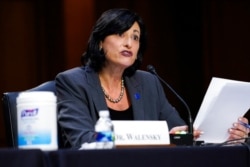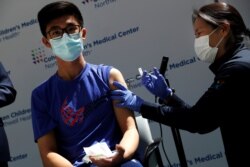Health officials are recommending lifting most COVID-19 restrictions for people who are fully vaccinated.
That means no more masks or social distancing, indoors or outdoors, according to updated guidance from the U.S. Centers for Disease Control and Prevention.
"If you are fully vaccinated, you can start doing the things that you had stopped doing because of the pandemic," said CDC Director Rochelle Walensky. "We have all longed for this moment."
For now, masks are still required on planes, trains and buses. Walensky said the CDC would be updating travel guidance soon, as well as recommendations for schools, camps and other settings.
Walensky left it up to local leaders to decide whether businesses and other gathering places should continue to require masks. The number of cases and the number of people vaccinated in an area should guide the choice, she said.
Experts said the announcement was mostly good news.
"The science on this is pretty clear. Vaccinated people rarely get sick and don't do much transmitting," Brown University School of Public Health Dean Ashish Jha wrote on Twitter.
"Wow," said former Baltimore Public Health Commissioner Leana Wen, who had criticized CDC's previous guidance as too cautious. "This does speak to the power of vaccines, but how can we be sure those around us are vaccinated? Not sure we all trust an honor code."
"This is why masks will likely still be required for all in public spaces like stores," added Jennifer Nuzzo, a senior scholar at Johns Hopkins University Center for Health Security. "But employers can use new guidelines for their employees." As cases decline and vaccinations increase, we will see mask requirements go away, she said.
Walensky said the CDC is updating the guidance because cases have fallen by one-third in the past two weeks and vaccines are widely available. U.S. regulators on Monday authorized the Pfizer-BioNTech vaccine for people as young as 12 years old.
Walensky also noted that new research published in the past couple of weeks has shown how effective the vaccines are in the real world, not just in controlled clinical trials, and how they even prevent infection with the variants circulating in the United States. And in the rare cases in which vaccinated people still get infected, their infections are milder and are less likely to spread to others than infections in unvaccinated people.
The announcement comes as vaccination rates are dropping in the United States. Just under 2 million doses a day are being administered on average, down from more than 3 million in mid-April.
For those still facing barriers to access, health officials are stepping up efforts to make getting vaccinated easier, including delivering doses to more than 20,000 local pharmacies and offering free rides to vaccination sites through ride-sharing companies.
For those hesitant or skeptical about getting the vaccine, the CDC is working with "trusted messengers" to spread the word and deliver shots, including local doctors and places of worship.
Walensky encouraged everyone to get vaccinated.
"Your health and how soon you return to normal life ... are in your very capable hands," she said.


